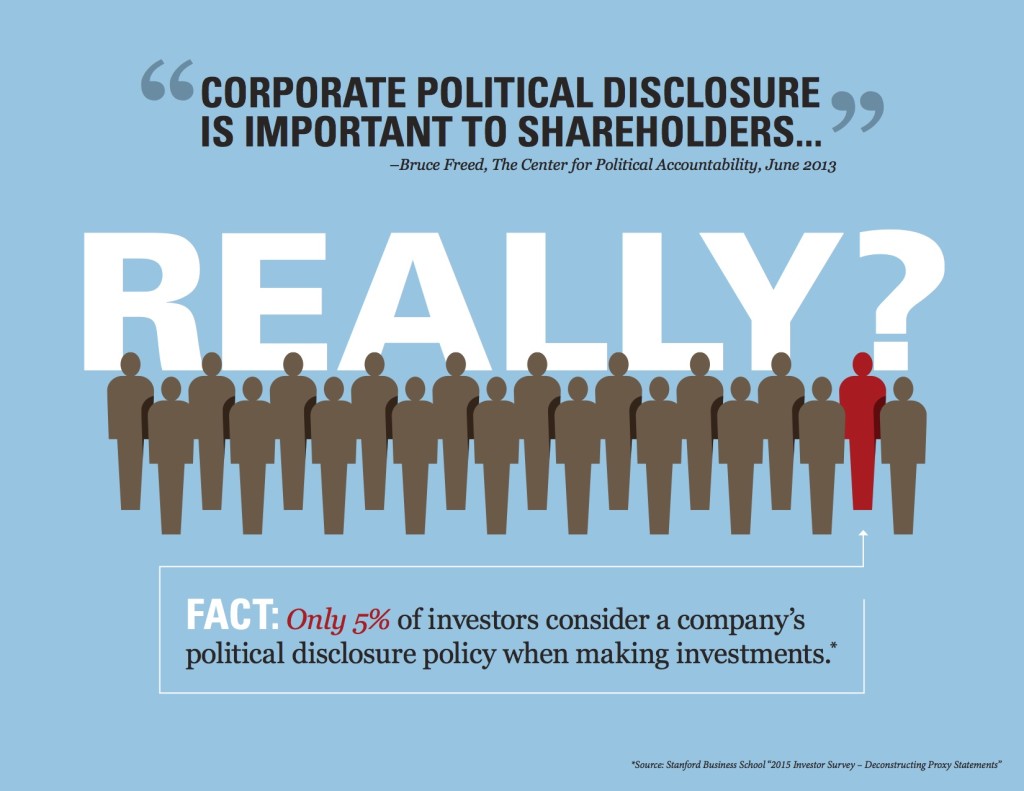A recent survey is once again demonstrating that investment managers are not interested in dragging politics into the corporate governance debate.
The Stanford Business School, partnering with RR Donnelley and Equilar, released its “2015 Investor Survey – Deconstructing Proxy Statements.” The survey questioned numerous asset managers and owners with a combined $17 trillion in assets “to understand how institutional investors use the information in corporate proxies to make voting and investment decisions.”
The survey found that only 19% of investors use the political contribution section for voting decisions, and only 5% use it for investment decisions.
One of the survey questions asked, “Which of the following sections of the proxy does your firm read and rely on to make voting decisions?” Multiple responses were allowed. The top five responses were: pay for performance alignment (64%); director independence (62%); performance metrics (62%); director nominee descriptions, their quality, qualifications, and skills (59%); and corporate governance profile, including shareholder rights and anti-takeover measures (59%). Political contributions ranked 19th out of 20 possible responses, with only 19% of respondents saying that their firm read and relied on this section to make voting decisions.
Another survey question asked “Which of the following sections of the proxy does your firm read and rely on to make investment decisions?” Again, multiple responses were allowed. The top five responses were: performance metrics (40%); pay for performance alignment (34%); corporate governance profile (33%); risk oversight (29%); and compensation philosophy (22%). Only 5% responded that the political contributions section was used to make investment decisions, placing it 17th out of 20 in importance.
The movement to drag politics into investment decisions isn’t about helping investors, it is about giving activists an opening to shame companies into staying out of the political process. After all, if investment managers believed that this information is of critical importance, they would have demanded increased access to this information long ago. Instead, serious investors with an economic interest of increasing returns to retirees have continued to signal their disinterest.
The Stanford survey results mirror proxy votes. Since 2012, the investors voted against disclosure proposals 82% of the time among Fortune 250 companies. Meanwhile 99.4% of the five largest US mutual funds abstained or voted against political and lobbying disclosure proposals.
This campaign is driven by activist organizations like the Center for Public Accountability, who lead the policy and advocacy charge. Meanwhile, social activist investors that make just a minimum investment of just $2,500 needed to file a proxy resolution threaten to smear companies in the media if they do not comply with activist demands.
Companies that face these resolutions need to see this for what it is – as a back door strategy to silence the business community through the corporate governance process. Instead of negotiating with activists, which only cedes more ground for them to come back and cause trouble the next year, bring them to a vote and you will see what all the statistics, surveys, and facts illustrate: your investors oppose the idea.















